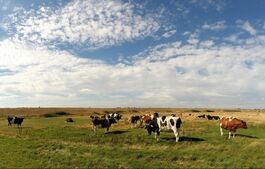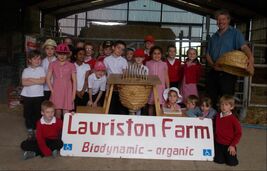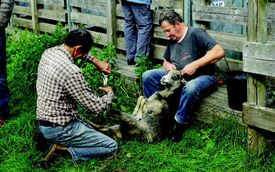ABOUT
Nestled behind the seawall on the Blackwater Estuary, just outside Goldhanger in Essex, England, Lauriston Farm’s 210 acres are managed using Biodynamic techniques and philosophy inspired by Rudolf Steiner’s Agriculture Lectures from 1924.
The farm is home to rare breed grass fed Shetland cattle and North Ronaldsay sheep, bee hives, laying hens, vegetables and woodland. Eighty-five percent of the farm is designated a Site of Special Scientific Interest and within this, there are two listed ancient monuments. We produce Demeter certified beef, lamb, vegetables, fruits and meadow hay and organically certified knitting yarn, sheepskin rugs and throws.
The farm is home to rare breed grass fed Shetland cattle and North Ronaldsay sheep, bee hives, laying hens, vegetables and woodland. Eighty-five percent of the farm is designated a Site of Special Scientific Interest and within this, there are two listed ancient monuments. We produce Demeter certified beef, lamb, vegetables, fruits and meadow hay and organically certified knitting yarn, sheepskin rugs and throws.
Conservation Farming & Horticulture through BiodynamicsThe farm has been very successful in improving existing habitat for rare, estuarine, ground nesting birds. It has also created new habitat through the planting of thousands of hedging plants, hundreds of willows, digging a large pond and letting two hectares revert to scrub.
Biodynamic farming is the perfect fit for conservation as it uses no chemical inputs and requires livestock. It is the cattle and sheep that produce the right grass sward for the ground nesting birds. Biodynamics also produces very high quality human food which we produce for sale. For more information click here. In addition, the method has an understanding of the importance of trees, shrubs, wetlands and wild areas for the overall productivity of the farm organism. We have noticed that the biodynamic field sprays are particularly important for the insect life on the farm. So many insects are in decline and into this bracket we place the honey bee. This means we give homes to honey bees but do not regard them as a income generating activity. Their healthy survival is essential to the future of humanity and as such we revere this animal. Our hives aim to give the bee as much opportunity to exhibit its natural behaviour and we are planting new flowers every year to provide healthy food for them. |
Education and Training
|
Day Placements for Adults with Learning DisabilitiesBiodynamic farming recognises the importance of human involvement in the farm, creating an atmosphere that people of all ages are drawn to. The history of the Camphill Communities has demonstrated the physical and mental benefits for many human conditions , in particular they focussed on adults with learning disabilities.
Lauriston is continuing this work by offering day placements in all areas of the farm work and processing of the farm produce. We can host up to seven people per day working alongside two members of our staff. Over time, the learning of new work skills is possible as well as new life skills. We aim to integrate our co-workers into the daily seasonal activities associated with community farming, regardless of personal abilities. This focus builds on a track record of good delivery for various individuals since 2006. The farm has wheelchair access throughout, including gardens, fields, toilets and kitchen. All staff and volunteers have up to date DBS checks and are currently being accredited to the CARE Farming UK code of good practice. |




